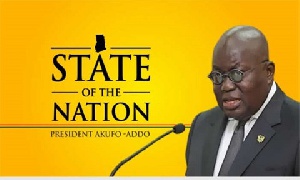It is no secret that the state of the nation address in Ghana has come to assume certain traits: dense statistics, shouting bouts, bureaucratic symbolism and opposition harassment. Usually, citizens who tune in observe a few things: cultural displays, fraternization between politicians, a president who comes in to give long speeches and then the usual media fiesta.
Sometimes, the MPs dress up to reflect their mood or bring props to make a point. The display of placards with various inscriptions has also come to stay. Ghanaians have not come to expect much from the state of the nation address except to observe a president in action and an opposition bent on embarrassing or harassing him.
However, this shouldn’t be the case. The state of the nation address should be an opportunity to showcase the growth and beauty of Afrocentric democracy. The address must be well delivered, the president must be well composed and the nation must be roused or rallied into action. A great state of the nation address must not be partisan.
It should be as patriotic, barrier crossing, history-making, bridge building and unifying as possible. The speech should be dotted with douses of history, tradition and enduring values that serve as the connective tissue to keep a nation of varying cultures and interests together as much as possible. And certainly, the content must be most substantive.
There are many Ghanaians who think the state of the nation address does not really capture the state of conditions Ghanaians find themselves in and doesn’t really offer much hope for the future. In truth, the address is the most significant speech of the president in any given year. The president must accurately capture the mood of the country We do not want to present a chaotic, violent, partisan, debasing, unserious and amateurish democratic image to the rest of the world.
Business interests and investors will be concerned with the actual content to figure out the health of the economy, the direction it is headed and general economic performance indicators. What is the rate of growth in terms of GDP; is there an uptick or a decline?
Where does the country’s debt stand? What about expenditure and confidence boosting mechanisms to shore up the economy? What is the nature of the nation’s trade balance and is economic outlook generally positive?
A good state of the nation address must be well delivered and competently communicated. The language must be easy to digest, the content must be concise and the delivery must be smooth. Needless to say, the address needs to be well written.
The president must demonstrate that he is familiar and comfortable with the information he is reading, the speech itself must be well practised and he needs to deliver it a conversational or genial manner rather than in a condescending tone.
Demeanour is equally important. The president must look and sound presidential but also engaged. There are many who will be watching out for his temperament and emotional disposition. Whatever happens, the president must avoid the temptation of responding to heckles or comments from the floor of the house or at least limit the number of times he does so.
The nation takes its cue from the president; he must be passionate, energetic and pleasant. His gesticulations and mannerisms must be minimal but align with the speech for effect and emphasis. Of course employing some rhetorical tools like anecdotes, proverbs, metaphors, humour and the use of keywords and phrases people identify with will help to make the speechless hard to listen to and further maintain an upbeat and lively tone.
The president needs to go out there and enjoy himself but the audience must enjoy the performance too. It will keep them awake and glued. He must minimise directly engaging with parliamentarians and sounding overly partisan. He must sound nationalistic, compromising and above the fray. He can also connect with Ghanaians by admitting areas the government has fallen short and empathising with the real challenges of everyday Ghanaians.
The address should introduce big plans, programs, policies and ideas that will move the nation up to the next level. The president needs to successfully paint a clear picture of the status of the nation, define what the problems or challenges are, what has been done in the past year to address daunting challenges, how effective those solutions have been and setting a clear course for the coming year.
In other words, the state of the nation address must contain the problem statement of the nation, the underlying theoretical, conceptual, ideological or philosophical framework guiding the presidency, the methodological approach to solving the problems, expected outcomes and future action plans.
It must be mentioned that the president must conscientiously underscore the basic values of the nation, enduring traditions, common historical antecedents while reducing political undertones to the speech in order to strike the right nationalistic tone.
Also, the state of the nation address must also inspire. It must have a soul, character a grand vision that inspires action. This is the government’s mission statement and vision for the next year or more. It must be memorable and it must propel the nation into action. It must have that extra ump that will set the course and direction for the nation not just for the short term, but perhaps, if done well, for generations to come.
Opinions of Thursday, 21 February 2019
Columnist: Dr Godwin Etse Sikanku



















